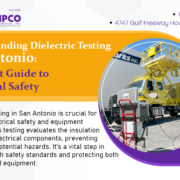Understanding Dielectric Testing San Antonio: A Perfect Guide to Electrical Safety
In today’s increasingly connected world, electrical systems form the backbone of industries, businesses, and households. Ensuring the safety and efficiency of these systems is critical, and Dielectric Testing San Antonio plays a pivotal role in achieving this. As one of the essential procedures in the electrical safety domain, dielectric testing helps identify potential flaws, minimize risks, and ensure the reliability of equipment in various environments.
For a city like San Antonio, where rapid growth is accompanied by heightened energy demands and infrastructure development, maintaining robust electrical safety measures is vital. Businesses, homes, and public facilities rely heavily on dependable electrical systems. This makes dielectric testing not only a technical necessity but also a significant factor in promoting safety and sustainability. By understanding its methods, applications, and benefits, you can take a proactive approach to protecting your assets and ensuring compliance with industry standards.
This guide explores Dielectric Testing San Antonio, outlining its significance, methods, and applications to ensure electrical safety.
What Is Dielectric Testing?
Dielectric testing is a process used to evaluate the insulation quality of electrical equipment. It measures the ability of an insulating material to withstand high-voltage electricity without breaking down. This testing is crucial for identifying potential flaws or weaknesses in electrical systems that could lead to dangerous faults, equipment damage, or even fires.
Key Types of Dielectric Testing
Dielectric Withstand Test:
- Also known as the “Hipot Test,” this method checks if electrical insulation can withstand high voltages without leaking current.
- Used during manufacturing to confirm the safety and reliability of devices.
Insulation Resistance Test:
- Measures the resistance of insulation materials to ensure they can handle voltage stress over time.
- Commonly performed during routine maintenance of electrical systems.
Partial Discharge Testing:
- Detects microscopic faults in insulation that could evolve into major breakdowns.
- Ideal for identifying potential failures in high-voltage equipment.
Why Is Dielectric Testing Important?
San Antonio’s growing industrial and residential infrastructure depends on robust electrical safety measures. Here’s why dielectric testing is indispensable:
- Prevent Electrical Failures: Early detection of insulation weaknesses helps prevent unexpected breakdowns.
- Ensure Compliance: Many industries in San Antonio must adhere to national and international safety standards, including IEEE and ASTM guidelines.
- Enhance Equipment Longevity: Properly tested equipment lasts longer, saving businesses significant repair and replacement costs.
- Protect Lives and Property: By reducing the risk of electrical fires and accidents, dielectric testing safeguards lives and assets.
When Should You Perform Dielectric Testing?
Dielectric testing is a proactive approach to electrical safety. Here are the ideal scenarios to conduct these tests:
During Equipment Manufacturing:
- Ensures that newly manufactured electrical products meet safety and performance standards.
Routine Maintenance:
- Regular testing helps detect insulation degradation in existing systems, particularly in high-stress environments like industrial facilities.
Post-Repair Testing:
- Verifies the safety and reliability of equipment after maintenance or repair work.
Before Installation:
- Testing cables, transformers, and switchgear before deployment ensures system reliability and safety from day one.
The Dielectric Testing Process
Understanding the step-by-step process of dielectric testing ensures better preparedness and implementation:
Preparation:
- Disconnect equipment from power sources and ensure all components are clean and dry.
- Verify test equipment calibration.
Test Execution:
- Apply high voltage to the insulation and monitor current flow.
- Record readings to identify any anomalies.
Analysis:
- Compare results with standard values to determine the insulation’s condition.
Documentation:
- Maintain detailed records for compliance, audits, and future reference.
Choosing the Right Dielectric Testing Service in San Antonio
Finding a reliable dielectric testing service provider is crucial for accurate and consistent results. Here’s what to look for:
Experience and Expertise:
Choose a company with a proven track record in dielectric testing for various applications.
Certifications:
Ensure the provider adheres to industry standards like ISO 9001 and follows OSHA safety regulations.
Comprehensive Services:
Opt for a provider offering end-to-end solutions, including insulation resistance, Hipot testing, and partial discharge analysis.
Responsive Support:
Select a team known for quick response times and exceptional customer service.
Common Applications of Dielectric Testing in San Antonio
Dielectric testing supports a wide range of sectors and applications, including:
Energy and Utilities:
Ensures the reliability of transformers, circuit breakers, and high-voltage cables.
Manufacturing:
Tests machinery and control panels to maintain operational safety.
Commercial and Residential:
Safeguards electrical installations in buildings, preventing hazards for occupants.
Transportation:
Verifies the safety of electrical systems in vehicles, trains, and aircraft.
Safety Tips During Dielectric Testing
Conducting dielectric testing involves high voltages and requires strict adherence to safety protocols:
Wear Protective Gear:
Use insulated gloves, safety glasses, and rubber-soled footwear.
Follow Manufacturer Guidelines:
Operate testing equipment as per the manufacturer’s instructions to avoid mishaps.
Isolate the Test Area:
Restrict access to the testing zone to prevent accidental contact.
Monitor Continuously:
Always keep a vigilant eye on the equipment and testing environment.
Advancing Electrical Safety in San Antonio
As San Antonio continues to evolve as a hub for innovation and growth, the role of Dielectric Testing San Antonio in ensuring electrical safety cannot be overstated. From industries to homes, this testing protects people, equipment, and infrastructure.
By choosing Kempco Inspection Services, Inc. professional dielectric testing services and adhering to best practices, you can safeguard your electrical systems against unexpected failures and compliance issues.




